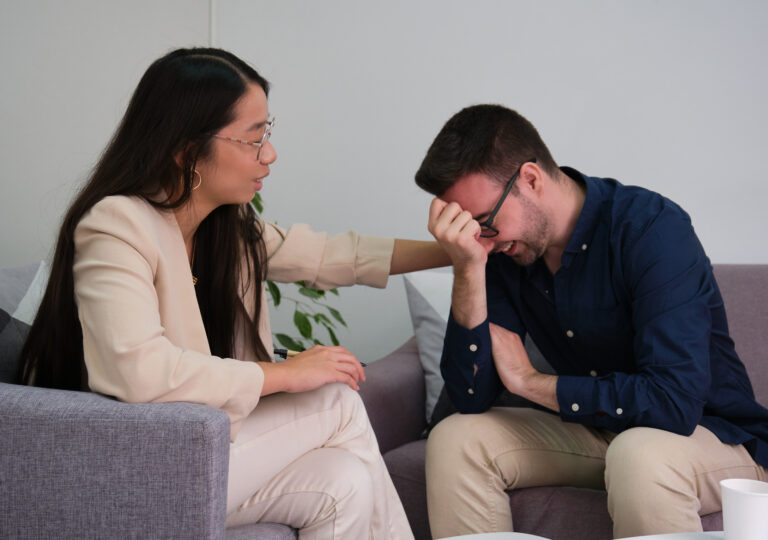Codependency is not a bad word
Codependency is more common than one may think. Here are some examples of how codependency in relationships shows up:
- Blurred boundaries between you and your partner
- Having a difficult time honoring your own needs and feelings
- Taking too much responsibility for what someone else does (you try to cover up or fix partner’s mistakes)
- Giving up your core needs and calling it a “compromise” then feeling resentful and getting upset
- Focusing on other people’s problems more than your own
- Trying to convince another person to change an aspect of themselves over and over again
- Complaining and threatening to leave the unhealthy relationship but staying and trying to control the situation instead
- Pressuring your partner to take steps in a relationship they are not ready for (move in together, get engaged, married, have children, etc.)
Codependency in relationships makes us rely on someone else for happiness, and we lose our sense of self in the process.
Because codependency has a negative stigma attached, it can leave those struggling with it with feelings of shame. In situations where there is addiction, infidelity and relational chaos symptoms such as hypervigilance, increased anxiety, depression and irritability are normal trauma responses. But when individuals get labeled “codependent” they often feel that they are the problem and the cause of someone else’s struggles and bad choices. However, all those behaviors are attempts to seek emotional safety. They are trauma responses and coping mechanisms.
What is Codependency and why is it problematic?
Codependency refers to enabling, controlling behaviors, poor boundaries, lack of self-care and focusing on other’s needs instead of one’s own needs. However, there are so many factors to consider before labeling someone as “codependent.” For example, what is appropriate in your culture in terms of closeness and connection with loved ones? Did you receive messages around self-care being selfish? Were you taught to give up your needs and put others first?
These different aspects of our identity are important to consider. There are covert and overt expectations and pressures related to gender, race, cultural upbringings, country of origin, etc. For example, many cisgender women I have worked with have shared that as women they were taught to be caring, understanding and nurturing. Some took on such roles in their family of origin. Other individuals have shared that as their family was chaotic and things were unpredictable, (for various reasons ranging from alcohol abuse to parents being stressed to mental health illness in families.) As a result, they learned early on to scan the moods of others and try to “fix” them. By accomplishing this, they felt more emotionally safe and increased connection to their parents.
Connection
We are made to connect with others. Connection to our parents is just as important as food (and some studies suggest that it’s even more important than food for infants). If the cost of that connection was to give up your own needs, then that can explain the codependency traits you are dealing with now. So as a child, you brilliantly developed coping mechanisms in order to maintain close relationships. And it worked for you when you were little. The problem is it’s not working for you now.
From a trauma-informed lens, codependency is a normal response to small and big traumatic experiences from emotional misattunement to neglect from caregivers in childhood. While understandable, codependency in relationships can be problematic as it can create feelings of resentment, feelings of loneliness, low self-esteem, anxiety, depression, relationship conflict, unhealthy dependency and more. However, healing is very much possible.
Take the first steps towards healing as a couple
When conflict comes up or you feel that codependency has found its home in your relationship, don’t worry. Please show up kindly to your partner and yourself. Before reacting, pause and think: am I trying to control this situation? What’s in my control and what’s not in my control? Remember, we can’t control others. Instead you can consider the following healthier alternatives:
- Can you express your feelings and needs instead?
- Can you explore your boundaries?
- Offer support without changing or fixing someone else
- Are you willing to share with your partner where these tendencies and fears are coming from for you so that he/she/they may better understand you?
- Allow your partner to share vulnerably too, and ask deepening, open ended questions.
- Ask what your partner may need, what your partner’s fears and hopes may be.
- Have your partner share with you if any of it connects to childhood or prior experiences for them. In relationships, we still want to be able to rely on our partners, but we want healthy dependency.
Take the first steps towards healing as an individual
Codependency in relationships shows up as the two individuals becoming merged. True connection is difficult to establish because when “two become one” there is no one left to connect with. It’s important that you also nurture your own self instead of only focusing on creating more closeness with your partner. Keep your own interests, hobbies and friends. Remember that your needs and interests also matter. Having a separate identity outside of being someone’s partner is healthy for any relationship.
Healing is possible. Please reach out to work with an experienced therapist who can help you untangle the web of the past that affects your present. Decide that your own emotional, physical and mental wellbeing is a priority, and it does not mean that you are selfish. Find a support group. Reach out to more friends. Make more friends. Be willing to not be defensive and see your role in this dynamic, no matter how big or small. Remember to do so without judgment and self-criticism, but with compassion and curiosity instead.
Final words on compassion and being human
Compassion is a prerequisite for any change. We heal, grow and change in supportive environments. We don’t need negative labels; we need understanding and permission to be flawed. Most of the experiences you have that are considered “codependent” are very much understandable from a trauma-informed perspective. Increased understanding of ourselves and our partners can help improve our relationships.
Sign Up and Start Your Relationship Transformation
Subscribe to Gottman Love Notes and get the latest on relationships, therapy, and much more from the experts. Includes a free download and access to special pricing on Gottman products every month.


